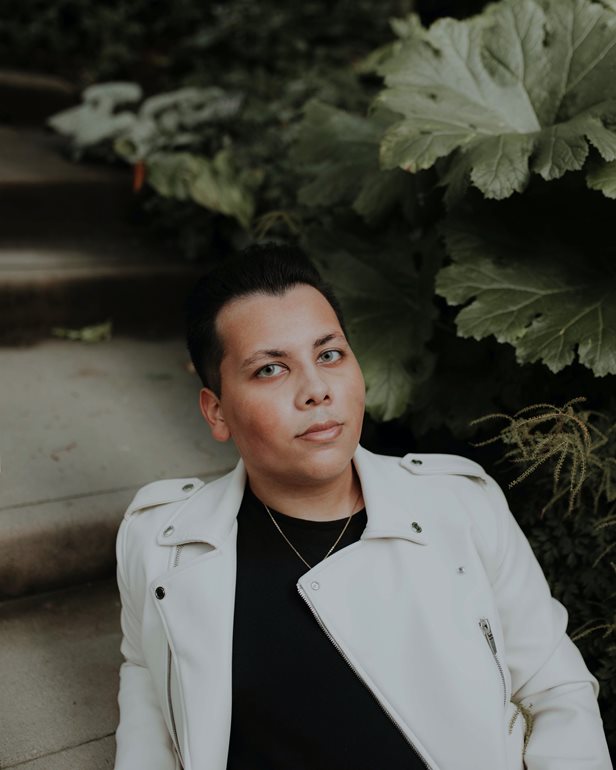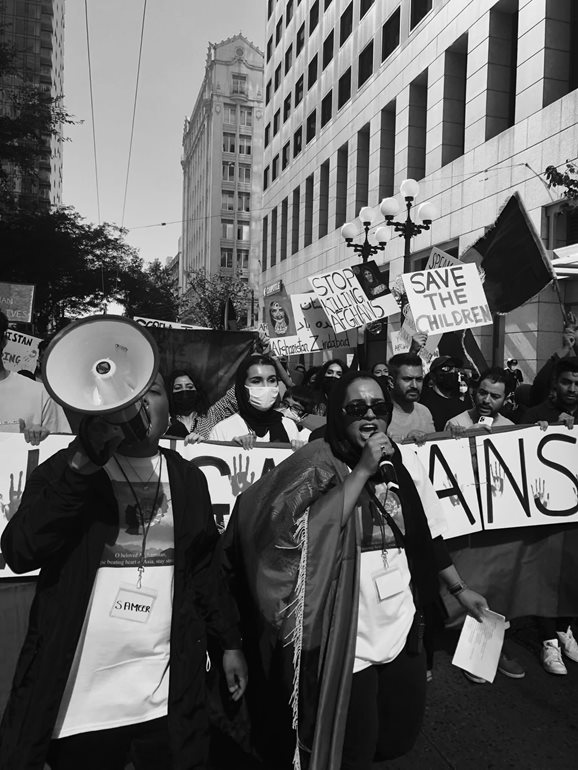The last time the Taliban was in power in Afghanistan in the 1990s, it banned music, photography, television and even children’s games such as flying kites. Now that its power has been restored, many Afghans fear the worst. Already there have been reports of brutality and intimidation, orders for women in government to leave their jobs and never return, and most recently, the segregation of men and women in universities.

For UW Bothell senior Sameer Mahan, these are more than just gut-wrenching news stories. They are his family’s reality. His parents, both born in Kabul, Afghanistan, in the 1970s, were forced to flee with their families when the Soviet Union invaded the country.
“It was truly devastating for my grandparents who had to leave behind their jobs, homes, even their photographs. My parents don’t have any pictures from their early childhood to look back on,” Mahan said. “As adults, I know they feel the gravity of all that loss.”
With their homeland being taken over again, Mahan and his parents fear that this time, they may lose what is most valuable of all — their loved ones’ lives. “We still have family living in Afghanistan, and it hurts me and my parents deeply to know we may never see them again,” he said. “We pray every day that they are safe.”
Building a bridge
The Taliban takeover also created another kind of loss for Mahan, a loss of possibility.
He may never safely step foot in the country where his parents were born and raised. Never get to meet his extended family and cousins. Never freely explore the neighborhoods where his parents once lived. Never enjoy the street foods his parents adored as kids and still talk about as adults.
And yet, even in the midst of such profound sadness and grief, Mahan has found a way to honor his family’s history in Kabul all the way from Seattle — bridging together his two worlds. In August, he co-founded Afghans of Seattle with 10 of his closest friends, including Shugla Kakar, UW Bothell alumna and 2019-20 student body president, and Sahar Yusufi, a 2018 University of Washington graduate.
Their organization provides Afghan refugees with assistance and resources. Mahan describes it as the “Google” of organizations as they strive to be the first place refugees turn for help, as well as their source for direction on where or how to get their needs met. “Ever since I was young, I would donate to organizations to help women and children in Afghanistan, but with the recent invasion I wanted to find a way to do more than just give money,” he said.
Already in the three months Afghans of Seattle has been active, Mahan and the other founding members have taken part in a global protest that led to the extension of the evacuation deadline, participated in televised interviews, met with members of the Washington Legislature and organized a donation drive.
“As a first-generation immigrant, I feel the need to help those in Afghanistan and those who are resettling in the states,” Mahan said. “I will do everything I can to make sure they have the same opportunities that I was given, such as being able to go to school, drive a car and get a job.”
Amplifying oppressed voices
One of the first things Afghans of Seattle did was host the Washington chapter of a peaceful, global protest, Stop Killing Afghans, on Aug. 28. The night before it took place, Mahan was asked by KING 5 if he would be willing to participate in an interview. Hoping to raise awareness for the protest, he agreed and went on air for the first time. “It was a little nerve-wracking,” he said, “but it was worth it to know people care about the work we are doing.”

Mahan also used the opportunity to explain to people he met at the media outlet the disappointment he and his community feel to only see themselves on television when tragedies are taking place. “Our country and people are rarely discussed positively when on the news,” he said. “It can be very sad seeing our culture diminished to violence instead of showing how beautiful our culture is.”
The station heard his concern and as part of the broadcast included images of Afghan people eating and dancing. “It was a small gesture, but it meant a lot,” he said.
The next day, the protest was held at Westlake Park in Seattle. It featured guest speakers from the American Muslim Empowerment Network, the Council on American Islamic Relations and the International Women’s Community Center. The protest attracted more than 300 people as well as the media attention of other outlets such as The Seattle Times, KIRO 7 and FOX 13.
This global protest helped lead to the evacuation deadline being extended. “It was incredible, a huge success,” Mahan said. “I didn’t realize how influential my voice was until that moment. I feel like I am part of the generation of change, and that makes me, and my family, proud.”
Transforming knowledge into action
As the co-founder and vice president of Afghans of Seattle, Mahan has also met with Gov. Jay Inslee and members of the legislature to share his community’s stories and amplify their voices.
And he has done all this while being a full-time college student.
A senior at UW Bothell, Mahan is majoring in Health Studies with a concentration in Public Health and a minor in Biology. He said he is grateful for the University and its sense of community. “Everyone is so close to one another, and the teachers are amazing — they are always there for you,” he said. “Being immersed in that environment helped me create Afghans of Seattle. The people of UW Bothell model the kind of community I want to cultivate at my organization.”
Mahan also puts particular value on a class that taught him about health care systems in different countries. “I plan on using that knowledge to help refugees get proper vaccines, including the ones for COVID-19, polio and measles,” he said.
Dr. Jody Early, professor in the School of Nursing & Health Studies and mentor to Mahan, said that as a student, “he is motivated to apply what he learns to serve people and communities. Sameer is not sitting on the sidelines waiting for others to do this work,” she said. “He’s leading efforts that literally save and improve people’s lives, all while juggling a full course load and a part-time job.”
After graduating this autumn quarter, Mahan wants to continue growing Afghans of Seattle and is excited to announce that he and his co-founders recently invested in a space to hold donation drives. “We plan on making donation kits — a kitchen kit, bedding kit, school kit, things like that,” he said. “Getting that space was a big step for us.”
Mahan is committed to being an ongoing resource for Afghan refugees, whether that means helping them with a resume, getting clothes for a job interview or learning how to drive a car. “I just want to keep helping,” he said.
“And above all else, I want to be a good role model and continue to make my community and my family proud.”



